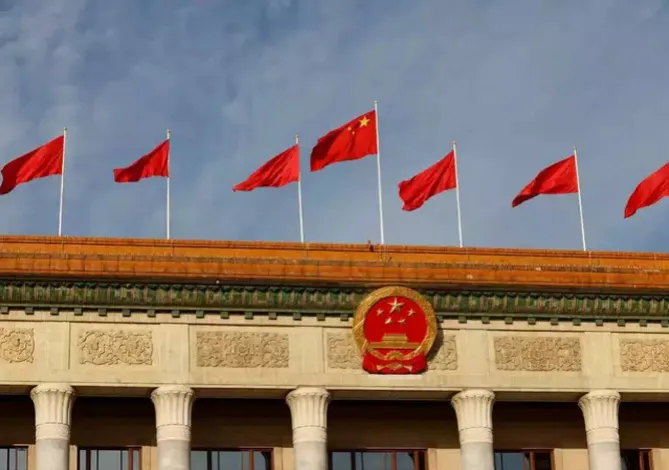-
CENTRES
Progammes & Centres
Location
Accompanying these country-level strategies is a range of defensive measures that the EU has put in place. These include two-way screenings of investments and anti-coercion mechanisms under the umbrella of its 'derisking' approach. At the same time, Europe is attempting to diversify its trade partners and supply chains in favour of more 'like-minded' nations in Asia, Latin America and elsewhere.

Following Europe’s recalibrated approach towards Beijing, 2023 marks a moment in the devolution, rather than evolution, of EU-China ties. Several European countries have released China-specific strategies that outline a more cautious approach towards China, largely embedded within the wider EU framework led by EU Chief Ursula von der Leyen.
Accompanying these country-level strategies is a range of defensive measures that the EU has put in place including two-way screenings of investments and anti-coercion mechanisms under the umbrella of its “de-risking” approach. At the same time, Europe is attempting to diversify its trade partners and supply chains in favour of more ‘like-minded’ nations in Asia, Latin America and elsewhere.
For Europe and China watchers, the 24th EU-China summit in Beijing, the first in-person one in four years, is a highly anticipated event. After Joe Biden’s meeting with Xi Jinping in November where Taiwan-related security business was somewhat satisfactorily addressed, the EU can afford to keep the focus of this year’s summit on economic issues after the previous one in April 2022 was dominated by the Ukraine war.
Issues on the table include Chinese subsidies for key industrial export sectors such as electric vehicles, perceived as undermining European competition. Brussels has already launched an investigation into these overcapacities and plans to probe other sectors such as medical devices as well. Another primary bone of contention is Europe’s massive trade deficit with China, its largest trading parter, that stood at an unsustainable €400 billion in 2022. The EU is vying for a more level-playing field and greater openness for European companies. A third crucial endeavour will be to limit the exports of Chinese goods that are contributing to Russia’s military industrial complex and enhancing Moscow’s technological capabilities. Estimates of over 70% hi-tech components and dual-purpose products being supplied to Russia by China have drawn ire and the risk of EU sanctions on at least 13 Chinese companies. The UK has just announced fresh sanctions on Chinese entities allegedly propelling Putin’s war machine.
Brussels has already launched an investigation into these overcapacities and plans to probe other sectors such as medical devices as well.
The summit comes at a critical juncture of frosty EU-China ties but also the Russia-Ukraine war nearing the completion of its second year. Much to Europe’s chagrin, China has not used its influence with Russia meaningfully to halt the war, and Europe has extrapolated some of the harsh lessons it has learnt from its over-dependence on Russian energy to its dealings with China.
Since the Covid19 pandemic, Europe’s engagement with China has become more conditional and increasingly scrutinised based on Beijing’s weaponisation of supply chains, its human rights violations in Xinjiang and Hong Kong, and tit-for-tat sanctions on officials that left the EU-China Comprehensive Agreement on Investment (CAI) frozen. China’s blockade of Lithuanian imports after Vilnius’s decision to open a Taiwan Representative Office and subsequent distortion of the EU single market contributed to ensuing tensions. Moreover, a number of developments have taken place at member state level such as Italy’s formal exit from the Belt and Road Initiative (which was due for a four-year renewal), in the footsteps of the Baltic states who exited the BRI soon after the signing of the Russia-China “no limits partnership”. These developments have made the EU’s balancing act since March 2019, which simultaneously labels China a “partner, competitor and systemic rival”, more challenging.
If Von der Leyen’s recent statements, acknowledging the “explicit element of rivalry in the relationship” amidst Beijing’s goals of “systemic change of the international order with China at its centre” are anything to go by, Brussels intends business during the summit. Europe could have the upper hand given the context of China’s economic slowdown making way for potential concessions amidst Beijing’s desire for a more independent European policy away from transatlantic pressures.
Yet “de-risking”, with its aims to limit interdependence in strategic and critical sectors, will only bear fruit if policies are effectively coordinated between member states, many of whom don’t see eye to eye when it comes to China. Despite the hawkish talk, mainstream European leaders have recently flocked to China in the pursuit of commercial interests while the usual suspects like Hungary’s Viktor Orban continue to push for closer ties to Beijing. In addition, Europe’s over-reliance on Chinese raw materials for its green transition also complicates de-risking ambitions.
China’s blockade of Lithuanian imports after Vilnius’s decision to open a Taiwan Representative Office and subsequent distortion of the EU single market contributed to ensuing tensions.
The challenge for Europeans involves more effective management of their interdependence with China. This will entail safeguarding Europe’s economic interests and maintaining access to China’s profitable market while managing security risks.
On Beijing’s part, its ability to reclaim Europe’s trust will depend on its willingness to yield on Europe’s concerns and iron out genuine areas of friction. Given general Chinese mismatch between rhetoric and actions, Brussels needn’t hold its breath.
This commentary originally appeared in Economic Times.
The views expressed above belong to the author(s). ORF research and analyses now available on Telegram! Click here to access our curated content — blogs, longforms and interviews.

Professor Harsh V. Pant is Vice President – Studies and Foreign Policy at Observer Research Foundation, New Delhi. He is a Professor of International Relations ...
Read More +
Shairee Malhotra is Associate Fellow, Europe with ORF’s Strategic Studies Programme. Her areas of work include Indian foreign policy with a focus on EU-India relations, ...
Read More +